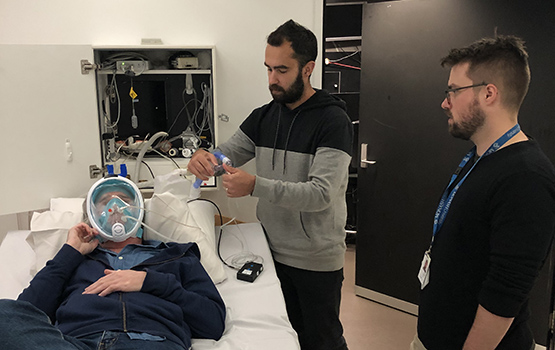Monash researchers adapt and test snorkels to help stop COVID-19 spread
Researchers from the Monash Institute of Medical Engineering, in collaboration with clinicians from Monash Partners Academic Health Science Centre, are working to co-develop and test a number of medical technology solutions to help keep doctors and patients safe when dealing with COVID-19.
A recreational snorkel mask is currently being adapted and has been approved for clinical trials to help minimise the spread of COVID-19 to health care workers and patients in the hospital setting.
The unique design of the snorkel mask will allow delivery of oxygen while simultaneously harnessing and filtering the air as it is exhaled to limit the spread of contaminated droplets.
Dr Simon Joosten, Senior Research Fellow at Monash University and respiratory specialist at Monash Health, said while government-enforced social distancing measures have brought researchers precious time, that comes at an economic and social cost to all Australians.
“It is our duty and responsibility to make the best use of this time to optimise our health system response. We are working to limit spread and optimise care at every turn,” said Dr Joosten.
“We asked ourselves: How can we best ventilate and treat our patients whilst reducing viral spread and protecting other patients and our frontline staff?
“This led to designing new prototypes, undertaking lab experiments and now testing our solutions with patients in clinical trials to address these challenges. This important work will assist in the usage of these types of masks worldwide.”
Another innovation in progress by the Monash teams is the development of modified CPAP ventilation masks for critically ill patients.
Ordinary CPAP masks have a vent in the front that allows for the escape of carbon dioxide when worn by a patient. Without the vent, the patient can rebreathe their own carbon dioxide, which can make them unwell.
However, with the vent, a sick patient with COVID-19 can spread the virus to other patients and health care staff.
The Monash team has developed safe, sealed CPAP mask systems, which along with the novel snorkel mask, have the potential to provide treatment while minimising virus spread.
Dr Joosten said the research team now has time to test this strategy, while in other countries many ventilation strategies simply had to be applied untested during the peak of the crisis when hospital equipment was overwhelmed.
“There has never been a more important time for the Australian research community to pool its resources in order to tackle a global health crisis not seen in more than a century. These collaborative initiatives are already progressing to patient trials aiming to improve the health of those with COVID-19, and keep frontline healthcare staff safe as they deal with this pandemic on a daily basis,” he said.
The research team comprises: Dr Simon Joosten (Monash Health and Research Fellow at Monash University), Dr Lee Djumas (Senior Lecturer, Materials Science & Engineering, and Research and Innovation Manager Woodside FutureLab, Monash University), Assoc Professor Darren Mansfield (Adjunct Associate Professor of Psychology, Monash University, Deputy Director Lung and Sleep Monash Health), Dr Bradley Edwards and Dr Shane Landry (Department of Physiology, Monash University).
Monash Institute of Medical Engineering fosters and coordinates translational medtech research across Monash University faculties, partner hospitals and collaborating medical research institutions.
Monash Partners Academic Health Centre is an innovative partnership between leading health service, teaching and research organisations. The purpose of Monash Partners is to connect researchers, clinicians and the community to innovate for better health for around 3.5 million Victorians. Their partners include: Alfred Health, Monash Health, Monash University, Peninsula Health, Eastern Health, Cabrini Health, Epworth HealthCare, Burnet Institute, Hudson Institute and Baker Heart and Diabetes Institute.

